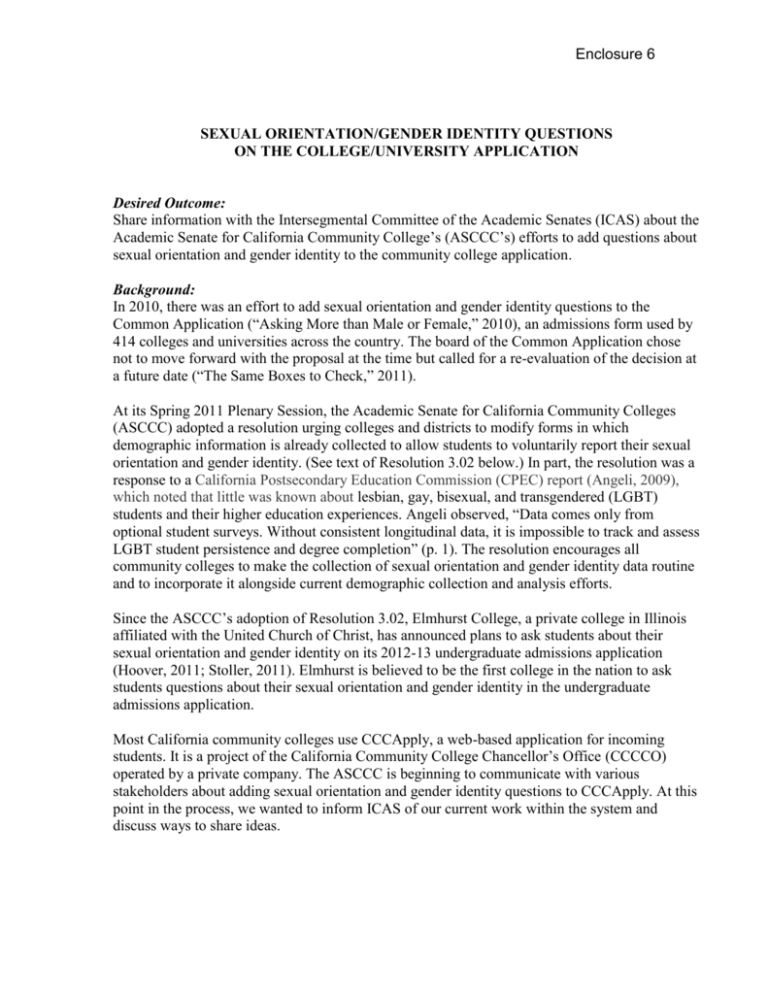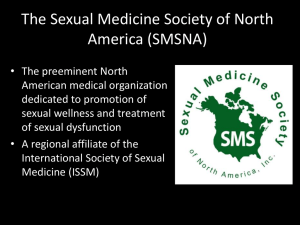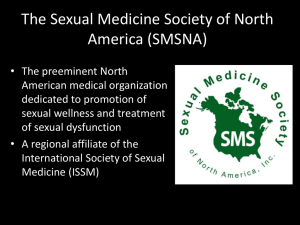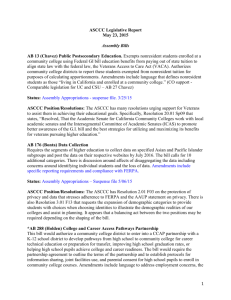
Enclosure 6
SEXUAL ORIENTATION/GENDER IDENTITY QUESTIONS
ON THE COLLEGE/UNIVERSITY APPLICATION
Desired Outcome:
Share information with the Intersegmental Committee of the Academic Senates (ICAS) about the
Academic Senate for California Community College’s (ASCCC’s) efforts to add questions about
sexual orientation and gender identity to the community college application.
Background:
In 2010, there was an effort to add sexual orientation and gender identity questions to the
Common Application (“Asking More than Male or Female,” 2010), an admissions form used by
414 colleges and universities across the country. The board of the Common Application chose
not to move forward with the proposal at the time but called for a re-evaluation of the decision at
a future date (“The Same Boxes to Check,” 2011).
At its Spring 2011 Plenary Session, the Academic Senate for California Community Colleges
(ASCCC) adopted a resolution urging colleges and districts to modify forms in which
demographic information is already collected to allow students to voluntarily report their sexual
orientation and gender identity. (See text of Resolution 3.02 below.) In part, the resolution was a
response to a California Postsecondary Education Commission (CPEC) report (Angeli, 2009),
which noted that little was known about lesbian, gay, bisexual, and transgendered (LGBT)
students and their higher education experiences. Angeli observed, “Data comes only from
optional student surveys. Without consistent longitudinal data, it is impossible to track and assess
LGBT student persistence and degree completion” (p. 1). The resolution encourages all
community colleges to make the collection of sexual orientation and gender identity data routine
and to incorporate it alongside current demographic collection and analysis efforts.
Since the ASCCC’s adoption of Resolution 3.02, Elmhurst College, a private college in Illinois
affiliated with the United Church of Christ, has announced plans to ask students about their
sexual orientation and gender identity on its 2012-13 undergraduate admissions application
(Hoover, 2011; Stoller, 2011). Elmhurst is believed to be the first college in the nation to ask
students questions about their sexual orientation and gender identity in the undergraduate
admissions application.
Most California community colleges use CCCApply, a web-based application for incoming
students. It is a project of the California Community College Chancellor’s Office (CCCCO)
operated by a private company. The ASCCC is beginning to communicate with various
stakeholders about adding sexual orientation and gender identity questions to CCCApply. At this
point in the process, we wanted to inform ICAS of our current work within the system and
discuss ways to share ideas.
Enclosure 6
Possible issues for ICAS consideration:
Adding questions about sexual orientation and gender identity to the application process
for one segment of California higher education would likely lead to media attention and
questions for the other segments. It may be desirable to begin those discussions in our
respective senates and systems in advance.
Collecting demographic data about sexual orientation and gender identity in California
will set a precedent. For that reason, the ASCCC wants to ensure that the questions are
carefully written, avoid bias, and provide meaningful data for longitudinal analysis. Any
help from colleagues at CSU and UC who study sexuality and gender identity would be
welcome collaboration.
There are probably policies in place across all three systems protecting student privacy
with respect to race, ethnicity, and sex, but it may be necessary to review and revise such
policies with respect to sexual orientation and gender identity.
References
Angeli, M. (2009). Access and Equity for All Students: Meeting the Needs of LGBT Students.
(California Postsecondary Education Commission [CPEC] Rep. No. 09-14). Retrieved
September 11, 2011, from http://www.cpec.ca.gov/completereports/2009reports/09-14.pdf
Asking more than male or female. (2010, August 12). Inside Higher Ed. Retrieved September
11, 2011, from http://www.insidehighered.com/news/2010/08/12/questions
Hoover, E. (2011, August 23). Elmhurst College will ask applicants about sexual orientation. The
Chronicle of Higher Education. Retrieved September 11, 2011, from
http://chronicle.com/blogs/headcount/elmhurst-college-will-ask-applicants-about-sexualorientation/28553
Stoller, E. (2011, August 24). Elmhurst College adds sexual orientation and gender identity to
admissions process. Inside Higher Ed. Retrieved September 11, 2011, from
http://www.insidehighered.com/blogs/student_affairs_and_technology/elmhurst_college_adds_s
exual_orientation_and_gender_identity_to_admissions_process
The same boxes to check. (2011, January 26). Inside Higher Ed. Retrieved September 11, 2011,
from
http://www.insidehighered.com/news/2011/01/26/common_application_rejects_new_questions_
on_sexual_orientation_and_gender_identity
Enclosure 6
Resolution 03.02 (Spring 2011):
CPEC REPORT, ACCESS AND EQUITY FOR ALL STUDENTS: MEETING THE NEEDS
OF LGBT STUDENTS
Whereas, The Academic Senate for California Community Colleges has long been committed to
serving the academic and student service needs of all students to the best of its ability with
limited resources;
Whereas, The California Postsecondary Education Commission’s June 2009 report, Access and
Equity for all Students: Meeting the Needs of LGBT Students
(http://www.cpec.ca.gov/completereports/2009reports/09-14.pdf) notes the lack of data regarding
lesbian, gay, bisexual and transgendered (LGBT) students and their experiences in California
higher education;
Whereas, The California Postsecondary Education Commission’s June 2009 report Access and
Equity for all Students: Meeting the Needs of LGBT Students recommends that colleges collect
data on sexual orientation and gender identity in the same way they currently allow students to
voluntarily report data on their race, ethnicity, gender, and disabilities; and
Whereas, The Academic Senate for California Community Colleges recognizes that privacy and
the security of an individual student’s information regarding sexual orientation and gender
identity is uniquely important for our LGBT students;
Resolved, That the Academic Senate for California Community Colleges support allowing
students to voluntarily report their sexual orientation and gender identity on college and district
forms where other demographic data are collected; and
Resolved, That the Academic Senate for California Community Colleges be actively involved in
helping create processes for collecting demographic data regarding sexual orientation and gender
identity that protect the privacy of individual students.
Source: http://www.asccc.org/resolutions/cpec-report-access-and-equity-all-students-meetingneeds-lgbt-students









